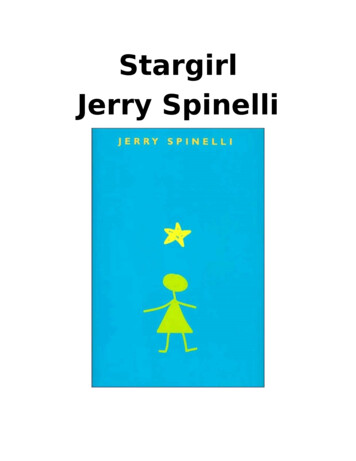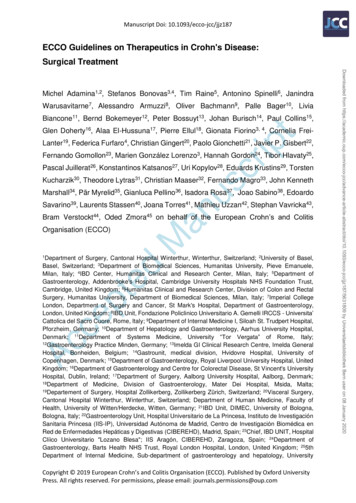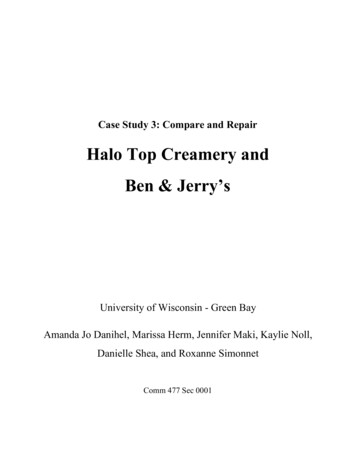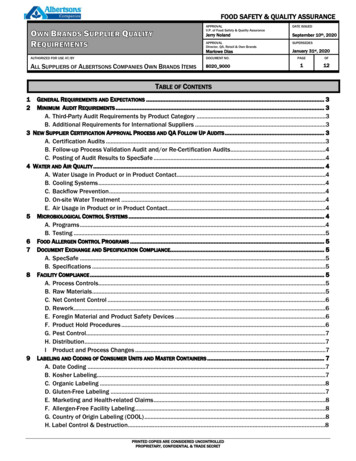
Transcription
StargirlJerry Spinelli
To Eileen,my StargirlAnd to Loren Eiseley,who taught us that even as we are,we are becomingAnd to Sonny Liston
PORCUPINE NECKTIEWhen I was little, my uncle Pete had a necktie with a porcupinepainted on it. I thought that necktie was just about the neatest thing inthe world. Uncle Pete would stand patiently before me while I ran myfingers over the silky surface, half expecting to be stuck by one of thequills. Once, he let me wear it. I kept looking for one of my own, but Icould never find one.I was twelve when we moved from Pennsylvania to Arizona. WhenUncle Pete came to say good-bye, he was wearing the tie. I thought hedid so to give me one last look at it, and I was grateful. But then, with adramatic flourish, he whipped off the tie and draped it around my neck.“It’s yours,” he said. “Going-away present.”I loved that porcupine tie so much that I decided to start a collection.Two years after we settled in Arizona, the number of ties in mycollection was still one. Where do you find a porcupine necktie in Mica,Arizona-or anywhere else, for that matter?On my fourteenth birthday, I read about myself in the localnewspaper. The family section ran a regular feature about kids on theirbirthdays, and my mother had called in some info. The last sentenceread: “As a hobby, Leo Borlock collects porcupine neckties.”Several days later, coming home from school, I found a plastic bag onour front step. Inside was a gift-wrapped package tied with yellowribbon. The tag said “Happy Birthday!” I opened the package. It was aporcupine necktie. Two porcupines were tossing darts with their quills,while a third was picking its teeth.I inspected the box, the tag, the paper. Nowhere could I find thegiver’s name. I asked my parents. I asked my friends. I called my unclePete. Everyone denied knowing anything about it.At the time I simply considered the episode a mystery. It did not occurto me that I was being watched. We were all being watched.1
“Did you see her?”That was the first thing Kevin said to me on the first day of school,eleventh grade. We were waiting for the bell to ring.“See who?” I said.“Hah!” He craned his neck, scanning the mob. He had witnessedsomething remarkable; it showed on his face. He grinned, stillscanning. “You’ll know.”There were hundreds of us, milling about, calling names, pointing tosummer-tanned faces we hadn’t seen since June. Our interest in eachother was never keener than during the fifteen minutes before the firstbell of the first day.I punched his arm. “Who?”The bell rang. We poured inside.I heard it again in homeroom, a whispered voice behind me as wesaid the Pledge of Allegiance:“You see her?”I heard it in the hallways. I heard it in English and Geometry:“Did you see her?”Who could it be? A new student? A spectacular blonde fromCalifornia? Or from back East, where many of us came from? Or one ofthose summer makeovers, someone who leaves in June looking like alittle girl and returns in September as a full-bodied woman, a ten-weekmiracle?And then in Earth Sciences I heard a name: “Stargirl.”I turned to the senior slouching behind me. “Stargirl?” I said. “Whatkind of name is that?”“That’s it. Stargirl Caraway. She said it in homeroom.”“Stargirl?”
“Yeah.”And then I saw her. At lunch. She wore an off-white dress so long itcovered her shoes. It had ruffles around the neck and cuffs and lookedlike it could have been her great-grandmother’s wedding gown. Herhair was the color of sand. It fell to her shoulders. Something wasstrapped across her back, but it wasn’t a book bag. At first I thought itwas a miniature guitar. I found out later it was a ukulele.She did not carry a lunch tray. She did carry a large canvas bag with alife-size sunflower painted on it. The lunchroom was dead silent as shewalked by. She stopped at an empty table, laid down her bag, slung theinstrument strap over her chair, and sat down. She pulled a sandwichfrom the bag and started to eat.Half the lunchroom kept staring, half started buzzing.Kevin was grinning. “Wha’d I tell you?”I nodded.“She’s in tenth grade,” he said. “I hear she’s been homeschooled tillnow.”“Maybe that explains it,” I said.Her back was to us, so I couldn’t see her face. No one sat with her,but at the tables next to hers kids were cramming two to a seat. Shedidn’t seem to notice. She seemed marooned in a sea of staring,buzzing faces.Kevin was grinning again. “You thinking what I’m thinking?” he said.I grinned back. I nodded. “Hot Seat.”Hot Seat was our in-school TV show. We had started it the yearbefore. I was producer/director, Kevin was on-camera host. Each monthhe interviewed a student. So far, most of them had been honor studenttypes, athletes, model citizens. Noteworthy in the usual ways, but notespecially interesting.Suddenly Kevin’s eyes boggled. The girl was picking up her ukulele.And now she was strumming it. And now she was singing! Strumming
away, bobbing her head and shoulders, singing, “I’m looking over afour-leaf clover that I overlooked before.” Stone silence all around.Then came the sound of a single person clapping. I looked. It was thelunch-line cashier.And now the girl was standing, slinging her bag over one shoulderand marching among the tables, strumming and singing and struttingand twirling. Heads swung, eyes followed her, mouths hung open.Disbelief. When she came by our table, I got my first good look at herface. She wasn’t gorgeous, wasn’t ugly. A sprinkle of freckles crossedthe bridge of her nose. Mostly, she looked like a hundred other girls inschool, except for two things. She wore no makeup, and her eyes werethe biggest I had ever seen, like deer’s eyes caught in headlights. Shetwirled as she went past, her flaring skirt brushing my pant leg, andthen she marched out of the lunchroom.From among the tables came three slow claps. Someone whistled.Someone yelped.Kevin and I gawked at each other.Kevin held up his hands and framed a marquee in the air. “Hot Seat!Coming Attraction-Stargirl!”I slapped the table. “Yes!”We slammed hands.2When we got to school the next day, Hillari Kimble was holding courtat the door.“She’s not real,” Hillari said. She was sneering. “She’s an actress. It’sa scam.”Someone called out, “Who’s scamming us?”“The administration. The principal. Who else? Who cares?” Hillariwagged her head at the absurdity of the question.
A hand flashed in the air: “Why?”“School spirit,” she spat back. “They think this place was too deadlast year. They think if they plant some nutcase in with the students-”“Like they plant narcs in schools!” someone else shouted.Hillari glared at the speaker, then continued,“-some nutcase who stirs things up, then maybe all the little studentswill go to a game once in a while or join a club.”“Instead of making out in the library!” chimed another voice. Andeverybody laughed and the bell rang and we went in.Hillari Kimble’s theory spread throughout the school and was widelyaccepted.“You think Hillari’s right?” Kevin asked me. “Stargirl’s a plant?”I snickered. “Listen to yourself.”He spread his arms. “What?”“This is Mica Area High School,” I reminded him. “It’s not a CIAoperation.”“Maybe not,” he said, “but I hope Hillari’s right.”“Why would you hope that? If she’s not a real student, we can’t haveher on Hot Seat.”Kevin wagged his head and grinned. “As usual, Mr. Director, you fail tosee the whole picture. We could use the show to expose her. Can’t yousee it?” He did the marquee thing with his hands: “Hot Seat UncoversFaculty Hoax!”I stared at him. “You want her to be a fake, don’t you?”He grinned ear to ear. “Absolutely. Our ratings will go sky-high!”I had to admit, the more I saw of her, the easier it was to believe shewas a plant, a joke, anything but real. On that second day she worebright-red baggy shorts with a bib and shoulder straps-overall shorts.
Her sandy hair was pulled back into twin plaited pigtails, each tied witha bright-red ribbon. A rouge smudge appled each cheek, and she hadeven dabbed some oversized freckles on her face. She looked likeHeidi. Or Bo Peep.At lunch she was alone again at her table. As before, when shefinished eating, she took up her ukulele. But this time she didn’t play.She got up and started walking among the tables. She stared at us.She stared at one face, then another and another. The kind of bold,I’m-looking-at-you stare you almost never get from people, especiallystrangers. She appeared to be looking for someone, and the wholelunchroom had become very uncomfortable.As she approached our table, I thought: What if she’s looking for me?The thought terrified me. So I turned from her. I looked at Kevin. Iwatched him grin goofily up at her. He wiggled his fingers at her andwhispered, “Hi, Stargirl.” I didn’t hear an answer. I was intensely awareof her passing behind my chair.She stopped two tables away. She was smiling at a pudding-bodiedsenior named Alan Ferko. The lunchroom was dead silent. She startedstrumming the uke. And singing. It was “Happy Birthday.” When shecame to his name she didn’t sing just his first name, but his full name:“Happy Birthday, dear Alan Fer-kooooh”Alan Ferko’s face turned red as Bo Peep’s pigtail ribbons. There was aflurry of whistles and hoots, more for Alan Ferko’s sake, I think, thanhers. As Stargirl marched out, I could see Hillari Kimble across thelunchroom rising from her seat, pointing, saying something I could nothear.“I’ll tell you one thing,” Kevin said as we joined the mob in thehallways, “she better be fake.”I asked him what he meant.“I mean if she’s real, she’s in big trouble. How long do you thinksomebody who’s really like that is going to last around here?”Good question.
Mica Area High School-MAHS-was not exactly a hotbed ofnonconformity. There were individual variants here and there, ofcourse, but within pretty narrow limits we all wore the same clothes,talked the same way, ate the same food, listened to the same music.Even our dorks and nerds had a MAHS stamp on them. If we happenedto somehow distinguish ourselves, we quickly snapped back into place,like rubber bands.Kevin was right. It was unthinkable that Stargirl could survive-or atleast survive unchanged-among us. But it was also clear that HillariKimble was at least half right: this person calling herself Stargirl may ormay not have been a faculty plant for school spirit, but whatever shewas, she was not real.She couldn’t be.Several times in those early weeks of September, she showed up insomething outrageous. A 1920s flapper dress. An Indian buckskin. Akimono. One day she wore a denim miniskirt with green stockings, andcrawling up one leg was a parade of enamel ladybug and butterflypins. “Normal” for her were long, floor-brushing pioneer dresses andskirts.Every few days in the lunchroom she serenaded someone new with“Happy Birthday.” I was glad my birthday was in the summer.In the hallways, she said hello to perfect strangers. The seniorscouldn’t believe it. They had never seen a tenth-grader so bold.In class she was always flapping her hand in the air, asking questions,though the question often had nothing to do with the subject. One dayshe asked a question about trolls-in U.S. History class.She made up a song about isosceles triangles. She sang it to herPlane Geometry class. It was called “Three Sides Have I, But Only TwoAre Equal.”She joined the cross-country team. Our home meets were held on theMica Country Club golf course. Red flags showed the runners the wayto go. In her first meet, out in the middle of the course, she turned leftwhen everyone else turned right. They waited for her at the finish line.She never showed up. She was dismissed from the team.
One day a girl screamed in the hallway. She had seen a tiny brownface pop up from Stargirl’s sunflower canvas bag. It was her pet rat. Itrode to school in the bag every day.One morning we had a rare rainfall. It came during her gym class. Theteacher told everyone to come in. On the way to the next class theylooked out the windows. Stargirl was still outside. In the rain. Dancing.We wanted to define her, to wrap her up as we did each other, but wecould not seem to get past “weird” and “strange” and “goofy.” Herways knocked us off balance. A single word seemed to hover in thecloudless sky over the school:HUH?Everything she did seemed to echo Hillari Kimble: She’s not real She’s not real And each night in bed I thought of her as the moon came through mywindow. I could have lowered my shade to make it darker and easier tosleep, but I never did. In that moonlit hour, I acquired a sense of theotherness of things. I liked the feeling the moonlight gave me, as if itwasn’t the opposite of day, but its underside, its private side, when thefabulous purred on my snow-white sheet like some dark cat come infrom the desert.It was during one of these nightmoon times that it came to me thatHillari Kimble was wrong. Stargirl was real.3We fought daily, Kevin and I.My main job as producer was to recruit people for the Hot Seat. After Isigned someone up, Kevin began researching the person, getting hisquestions ready.Every day he asked me, “Did you sign her up?”Every day I answered no.
He got frustrated.“What do you mean, no? Don’t you want to sign her up?”I told him I wasn’t sure.His eyes bugged out. “Not sure? How can you not be sure? We highfived in the lunchroom weeks ago. We were thinking Stargirl miniseries, even. This is a Hot Seat from heaven.”I shrugged. “That was then. Now I’m not sure.”He looked at me like I had three ears. “What’s there to be not sureabout?”I shrugged.“Well then,” he said, “I’ll sign her up.” He walked away.“You’ll have to find another director, then,” I said.He stopped. I could almost see the steam rising from his shoulders.He turned, pointed. “Leo, you can be a real jerk sometimes.” He walkedoff.It was uncomfortable. Kevin Quinlan and I usually agreed oneverything. We had been best friends since arriving in Arizona thesame week four years before. We both thought the prickly pear cactuslooked like Ping-Pong paddles with whiskers, and that saguaros lookedlike dinosaur mittens. We both loved strawberry-banana smoothies. Weboth wanted to go into television. Kevin often said he wanted to be asleazy talk show host, and he wasn’t kidding. I wanted to be a sportsannouncer or news anchor. We conceived Hot Seat together andconvinced the faculty to let us do it. It was an instant hit. It quicklybecame the most popular thing in school.So why was I balking?I didn’t know. I had some vague feelings, but the only one I couldidentify was a warning: Leave her alone.In time “Hillari’s Hypothesis” (so called by Kevin) about Stargirl’sorigins gave way to other theories.
She was trying to get herself discovered for the movies.She was sniffing fumes.She was homeschooling gone amok.She was an alien.The rat she brought to school was only the tip of the iceberg. She hadhundreds of them at home, some as big as cats.She lived in a ghost town in the desert.She lived in a bus.Her parents were circus acrobats.Her parents were witches.Her parents were brain-dead vegetables in a hospital in Yuma.We watched her sit down in class and pull from her canvas bag a blueand yellow ruffled curtain that she draped over three sides of her desk.We saw her set out a three-inch clear glass vase and drop into it awhite and yellow daisy. She did and undid this in every class sheattended, six times a day. Only on Monday mornings was the daisyfresh. By last period the petals were drooping. By Wednesday thepetals began to fall, the stem to sag. By Friday the flower hung downover the rim of the waterless vase, its dead stump of a head sheddingyellow dust in the pencil groove.We joined her as she sang “Happy Birthday” to us in the lunchroom.We heard her greet us in the hallways and classrooms, and wewondered how she knew our names and our birthdays.Her caught-in-headlights eyes gave her a look of perpetualastonishment, so that we found ourselves turning and looking backover our shoulders, wondering what we were missing.She laughed when there was no joke. She danced when there was nomusic.She had no friends, yet she was the friendliest person in school.
In her answers in class, she often spoke of sea horses and stars, butshe did not know what a football was.She said there was no television in her house.She was elusive. She was today. She was tomorrow. She was thefaintest scent of a cactus flower, the flitting shadow of an elf owl. Wedid not know what to make of her. In our minds we tried to pin her to acorkboard like a butterfly, but the pin merely went through and awayshe flew.Kevin wasn’t the only one. Other kids pestered me: “Put her on theHot Seat!”I lied. I said she was only a tenth-grader and you had to be at least ajunior to be on Hot Seat.Meanwhile, I kept my distance. I observed her as if she were a bird inan aviary. One day I turned a corner and there she was, coming right atme, the long skirt softly rustling, looking straight at me, surroundingme with those eyes. I turned and trotted off the other way. Seatingmyself in my next class, I felt warm, shaken. I wondered if myfoolishness showed. Was I myself becoming goofy? The feeling I hadhad when I saw her around the corner had been something like panic.Then one day after school I followed her. I kept at a safe distance.Since she was known not to take a bus, I expected the walk to beshort. It wasn’t. We trekked all over Mica, past hundreds of grasslessstone-and-cactus front yards, through the Tudorized shopping center,skirting the electronics business park around which the city had beeninvented a mere fifteen years before.At one point she pulled a piece of paper from her bag. She consultedit. She seemed to be reading house numbers as she walked along.Abruptly she turned up a driveway, went to the front door, and leftsomething in the mailbox.I waited for her to move off. I looked around-no one on the street. Iwent to the mailbox, pulled out a homemade card, opened it. Each tall
letter was a different painted color. The card said: CONGRATULATIONS!It was unsigned.I resumed following her. Cars pulled into driveways. It was dinnertime.My parents would be wondering.She took the rat from the bag and put it on her shoulder. Riding there,the rat faced backward, its tiny triangular face peeping out of her sandcolored hair. I could not see its beady black eyes, but I guessed it waslooking at me. I fancied it was telling her what it saw. I fell farther back.Shadows crossed the streets.We passed the car wash and the bike shop. We passed the countryclub golf course, the biggest spread of green grass until the next golfcourse in the next town. We passed the “Welcome to Mica” sign. Wewere walking westward. There was us and the highway and the desertand the sun blazing above the Maricopa Mountains. I wished I had mysunglasses.After a while she veered from the highway. I hesitated, then followed.She was walking directly into the setting sun, now a great orangeperched atop the mountain crests. For a minute the mountains werethe same dusky lavender as her sand-skimming skirt. With every stepthe silence grew, as did my sense that she knew-had known all alongthat she was being followed. Or more, that she was leading me. Shenever looked back.She strummed her ukulele. She sang. I could no longer see the rat. Iimagined it was dozing in the curtain of her hair. I imagined it wassinging along. The sun lay down behind the mountains.Where was she going?In the gathering dusk, the saguaros flung shadows of giants acrossthe pebbled earth. The air was cool on my face. The desert smelled ofapples. I heard something-a coyote? I thought of rattlesnakes andscorpions.I stopped. I watched her walk on. I stifled an impulse to call after her,to warn her of what?
I turned and walked, then ran, back to the highway.4At Mica Area High School, Hillari Kimble was famous for three things:her mouth, The Hoax, and Wayne Parr.Her mouth spoke for itself, most often to complain.The episode that became known as Hillari’s Hoax took place in hersophomore year, when she tried out for cheerleading. Her face andhair and figure were right enough, and she surely had the mouth-shemade the squad easily. And then she stunned everyone by turning itdown. She said she just wanted to prove that she could do it. She saidshe had no intention of yammering and bouncing in front of emptybleachers (which was usually the case). And anyway, she hated sports.As for Wayne Parr, he was her boyfriend. Mouthwise, he was heropposite: he seldom opened his. He didn’t have to. All he had to dowas appear. That was his job: appear. By both girls’ and boys’standards, Wayne Parr was gorgeous.But he was more-and less-than that.In terms of achievement, Wayne Parr seemed to be nobody. He playedon no sports team, joined no organization, won no awards, earned noA’s. He was elected to nothing, honored for nothing-and yet, though Idid not realize this until years later, he was grand marshal of our dailyparade.We did not wake up in the morning and ask ourselves, “What willWayne Parr wear today?” or “How will Wayne Parr act today?” At least,not consciously. But on some level below awareness, that is exactlywhat we did. Wayne Parr did not go to football and basketball games,and by and large, neither did we. Wayne Parr did not ask questions inclass or get worked up over teachers or pep rallies, and neither did we.Wayne Parr did not much care. Neither did we.Did Parr create us, or was he simply a reflection of us? I didn’t know. Iknew only that if you peeled off one by one all the layers of the studentbody, you would have found at the core not the spirit of the school, but
Wayne Parr. That’s why, in our sophomore year, I had recruited Parr forthe Hot Seat. Kevin was surprised.“Why him?” Kevin said. “What’s he ever done?”What could I say? That Parr was a worthy subject precisely becausehe did nothing, because he was so monumentally good at doingnothing? I had only a vague insight, not the words. I just shrugged.The highlight of that Hot Seat came when Kevin asked Parr who washis hero, his role model. It was one of Kevin’s standard questions.Parr answered, “GQ.”In the control room, I did a double take. Was the sound working right?“GQ?” Kevin repeated dumbly. “Gentleman’s Quarterly? Themagazine?”Parr did not look at Kevin. He looked straight at the camera. Henodded smugly. He went on to say he wanted to become a male model,his ultimate ambition was to be on the cover of GQ. And right there heposed for the camera-he had that disdainful model look down pat-andsuddenly I could see it: the jaw square as the corner of a cover, thechiseled cheeks, the perfect teeth and hair.That, as I say, took place toward the end of our sophomore year. Ithought then that Wayne Parr would always reign as our grandmarshal. How could I have known that he would soon be challenged bya freckle-nosed homeschooler?5The call came from Kevin on a Friday night. He was at the footballgame. “Quick! Hurry! Drop whatever you’re doing! Now!”Kevin was one of the few who went to games. The school keptthreatening to drop football because of low attendance. They saidticket receipts were barely enough to pay for electricity to light thefield.But Kevin was screaming on the phone. I jumped in the family pickupand raced to the stadium.
I bolted from the truck. Kevin was at the gate, windmilling his arm:“Hurry!” I threw the two-dollar admission at the ticket window and weraced for the field. “See better up here,” he said, yanking me into thestands. It was halftime. The band was on the field, all fourteen of them.Among the students it was known as “The World’s Smallest StandingBand.” There weren’t enough of them to form recognizable letters orshapes-except for a capital “I”-so they didn’t march much at halftimesof games. They mostly stood. In two rows of seven each, plus thestudent conductor. No majorettes. No color guard. No flag and riflegirls.Except this night. This night Stargirl Caraway was on the field withthem. As they played, rooted in their places, she pranced around thegrass in her bare feet and long lemon-yellow dress. She roamed fromgoalpost to goalpost. She swirled like a dust devil. She marched stifflylike a wooden soldier. She tootled an imaginary flute. She pogoed intothe air and knocked her bare heels together. The cheerleaders gapedfrom the sidelines. A few people in the stands whistled. The rest-theybarely outnumbered the band-sat there with What is this? on theirfaces.The band stopped playing and marched off the field. Stargirl stayed.She was twirling down the forty-yard line when the players returned.They did a minute of warm-up exercises. She joined in: jumping jacks,belly whomps. The teams lined up for the second half kickoff. The ballperched on the kicking tee. She was still on the field. The referee blewhis whistle, pointed to her. He flapped his hand for her to go away.Instead, she dashed for the ball. She plucked it off the tee and dancedwith it, spinning and hugging it and hoisting it into the air. The playerslooked at their coaches. The coaches looked at the officials. Theofficials blew their whistles and began converging on her. The solepoliceman on duty headed for the field. She punted the ball over thevisiting team’s bench and ran from the field and out of the stadium.Everyone cheered: the spectators, the cheerleaders, the band, theplayers, the officials, the parents running the hot dog stand, thepoliceman, me. We whistled and stomped our feet on the aluminumbleachers. The cheerleaders stared up in delighted surprise. For thefirst time, they were hearing something come back from the stands.They did cartwheels and backflips and even a three-tier pyramid. Old-
timers-or as old as timers got in a city as young as Mica-said they hadnever heard such a racket.For the next home game more than a thousand people showed up.Everyone but Wayne Parr and Hillari Kimble. There was a line at theticket window. The refreshment stand ran out of hot dogs. A secondpoliceman was called in. The cheerleaders were in their glory. Theyscreamed up at the bleachers: “GIMME AN E!” The bleachers screamedback: “EEEE!” (We were the Electrons, in honor of the town’selectronics heritage.)The cheerleaders ran through all their routines before the first quarterwas over. The band was loud and peppy. The football team even scoreda touchdown. In the stands heads kept swinging to the edges of thefield, to the entrance, to the streetlamp-lighted darkness behind thestadium. The sense of expectation grew as the first half came to aclose. The band marched smartly onto the field. Even they werelooking around.The musicians did their program. They even formed a small, lopsidedcircle. They seemed to linger on the field, drawing out their notes,waiting. Finally, reluctantly, they marched to the sideline. The playersreturned. They kept glancing around as they did their warm-ups. Whenthe referee raised his arm and blew his whistle for the second half tobegin, a sense of disappointment fell over the stadium. Thecheerleaders’ shoulders sagged.She wasn’t coming.On the following Monday, we got a shock in the lunchroom. Bleachedblond and beautiful Mallory Stillwell, captain of the cheerleaders, wassitting with Stargirl. She sat with her, ate with her, talked with her,walked out with her. By sixth period the whole school knew: Stargirlhad been invited to become a cheerleader and had said yes.People in Phoenix must have heard us buzzing. Would she wear theusual skirt and sweater like everyone else? Would she do the usual
cheers? Did all the cheerleaders want this, or was it just the captain’sidea? Were they jealous?Cheerleading practice drew a crowd. At least a hundred of us stood bythe parking lot that day, watching her learn the cheers, watching herjump around in her long pioneer dress.She spent two weeks practicing. Halfway through the second weekshe wore her uniform: green-trimmed white V-neck cotton sweater,short green and white pleated skirt. She looked just like the rest ofthem.Still, to us she was not truly a cheerleader, but Stargirl dressed likeone. She continued to strum her ukulele and sing “Happy Birthday” topeople. She still wore long skirts on non-game days and made a homeof her school desks. When Halloween arrived, everyone in herhomeroom found a candy pumpkin on his or her desk. No one had toask who did it. By then most of us had decided that we liked having heraround. We found ourselves looking forward to coming to school, toseeing what bizarre antic she’d be up to. She gave us something totalk about. She was entertaining.At the same time, we held back. Because she was different. Different.We had no one to compare her to, no one to measure her against. Shewas unknown territory. Unsafe. We were afraid to get too close.Also, I think we were all waiting to see the outcome of an event thatloomed larger and larger with every passing day. The next birthdaycoming up was Hillari Kimble’s.6Hillari herself set the stage the day before. In the middle of lunch, shegot up from her table and walked over to Stargirl. For half a minute shejust stood behind Stargirl’s chair. Silence everywhere except fortinklings in the kitchen. Only Stargirl was still chewing. Hillari movedaround to the side.“I’m Hillari Kimble,” she said.
Stargirl looked up. She smiled. She said, “I know.”“My birthday is tomorrow.”“I know.”Hillari paused. Her eyes narrowed. She jabbed her finger in Stargirl’sface. “Don’t try singing to me, I’m warning you.”Only those at nearby tables heard Stargirl’s faint reply: “I won’t singto you.”Hillari gave a satisfied smirk and walked off.From the moment we arrived at school the next day, the atmospherebristled like cactus paddles. When the buzzer sounded for first lunch,we leaped for the doors. We swarmed into the food lines. We racedthrough our choices and hurried to our seats. Never had we moved sofast so quietly. At most, we whispered. We sat, we ate. We were afrai
“Yeah.” And then I saw her. At lunch. She wore an off-white dress so long it covered her s











